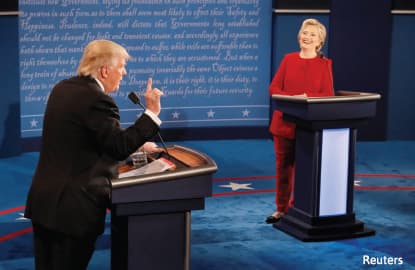
SINGAPORE (Oct 5): Following the Sept 26 debate, Hillary Clinton inched ahead of Donald Trump by 1.5 percentage points in the national polls, widening her lead to 3.8 percentage points.
Citi Research continues to maintain its forecast of a 60% probability of Clinton winning the election, and said in a note on Tuesday that Clinton is currently leading in 18 of the 20 swing states post debate, losing only in Ohio.
While polls are predicting higher probabilities of a Clinton win, what is most striking is the improvement in her personal favorability numbers, says Citi analyst Tina Fordham, although the longevity of those numbers remain unclear.
More importantly, the brokerage is on the lookout for unusual events that may affect the election outcome. These include another health scare, major scandal, terrorist attack, game-changing gaffe or information warfare incident.
Fordham also does not rule out possibility that neither candidate garners the 270 electoral college votes needed to win, in which case the decision would go to the House of Representatives. That could mean the candidate with the most electoral college votes or the candidate with the highest popular vote may not get into the White House.
Still, the market remains relatively optimistic about a Hillary victory. Fordham notes that the recent rally in the US dollar against the Mexican peso — seen as an indication of the growing Trump win risk — waned after the debate.
Bond yields have also continued its decline despite the high probability of an expansionary fiscal policy in a Trump presidency. That is even though the last fiscal stimulus (TARP) was “extremely unpopular with voters”, insists Fordham.
With five weeks left to polling day, Fordham says Clinton’s challenges include boosting voter turnout from her supporters and gaining millennial voters who prefer third-party candidates.
For the latter, the presidential debates appear to have a greater impact than in previous elections as 15% to 20% of voters remain undecided or are rooting for a third-party candidate. In 2012, that proportion was 12%.